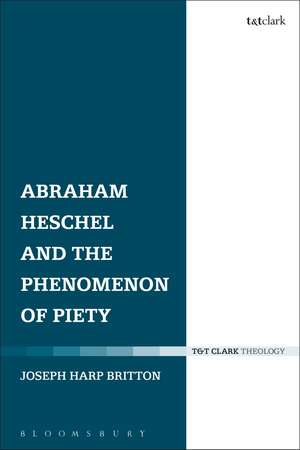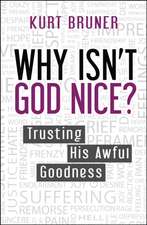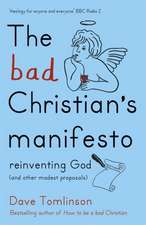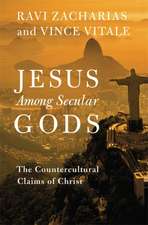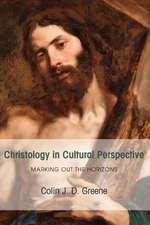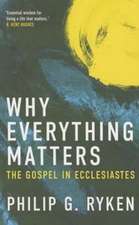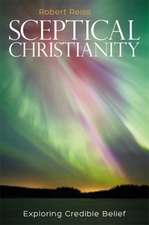Abraham Heschel and the Phenomenon of Piety
Autor Professor Joseph Harp Brittonen Limba Engleză Paperback – 22 apr 2015
Preț: 259.79 lei
Preț vechi: 296.58 lei
-12% Nou
Puncte Express: 390
Preț estimativ în valută:
49.72€ • 51.51$ • 41.49£
49.72€ • 51.51$ • 41.49£
Carte tipărită la comandă
Livrare economică 21 martie-04 aprilie
Preluare comenzi: 021 569.72.76
Specificații
ISBN-13: 9780567663115
ISBN-10: 0567663116
Pagini: 328
Dimensiuni: 156 x 234 x 15 mm
Greutate: 0.48 kg
Editura: Bloomsbury Publishing
Colecția T&T Clark
Locul publicării:London, United Kingdom
ISBN-10: 0567663116
Pagini: 328
Dimensiuni: 156 x 234 x 15 mm
Greutate: 0.48 kg
Editura: Bloomsbury Publishing
Colecția T&T Clark
Locul publicării:London, United Kingdom
Caracteristici
The book indicates how piety can be deployed theologically, particularly considering contemporary and post-modern issues
Notă biografică
Joseph Britton is President and Dean of the Berkeley Divinity School at Yale University, USA, where he teaches Anglican history and theology as the McFaddin Associate Professor (Adjunct) of Pastoral Theology. He completed his doctoral studies at the Institut Catholique de Paris, France.
Cuprins
The Nature of Piety \ 1 Introduction: Piety as a point of departure \ 2 The Concept of Piety \ The Intellectual Foundations of Heschel's Theology \ 3 The Contours and Influence of Heschel's Theology \ 4 Beyond Rationalism to Understanding \ 5 Polarity as a Fundamental Attribute of Piety \ Heschel's Studies of Piety \ 6 A Phenomenology of Piety: The Orientation of the Individual to the Transcendent \ 7 Piety as a Mode of Understanding \ 8 Piety as an Ethical Concept \ 9 Piety as a response to the "Other" \ The Pertinence of Piety in Theological Reflection \ 10 Engaging Contemporary Issues in Theology \ Conclusion: Indications of Piety for a Relational Theology \ Bibliography \ Index
Recenzii
The text is very fertile soil, and rewards the careful reader.
To Jewish scholars interested in Heschel, it will offer a fresh take on his work, emphasizing piety as a central theme that has nevertheless been neglected in previous critical studies. Christian theologians will not only be introduced to an unjustly neglected Jewish conversation partner, but will also be pointed to a fruitful methodological focus on piety that is transferable to their own work. The book points a way for these connections to be made by drawing attention to a wide variety of intersections between Heschel's work and other contemporary Christian theological projects, showing that there is something important to learn from-and not just about-Heschel's theology.
This lucid, meditative study provides the key to Heschel's biblical thinking and develops substantial comparisons with Christian thinkers from Augustine, through Kant, Schleiermacher, Scheler, Heidegger, as well as Rowan Williams and postmodern theologians. The careful analyses of Dilthey and Levinas are especially welcome. Britton interprets the full range of Heschel's works and the critical literature with both sympathy and critical candor. This book is indispensable to grasp Heschel's phenomenology of piety which combines mysticism and ethics in a relational theology.
In this outstanding book, Joseph Harp Britton highlights the major theme in the writings of Abraham Joshua Heschel and at the core of his life, action and devotion: piety as 'a mode of engagement with the other'. Heschel's key category of 'pathos' - in its theological and anthropological dimension - is the object of Britton's phenomenological inquiry. Piety is the human counterpart to God's pathos, how we respond to and engage with the covenanted relationship desired by God. Piety pervades the human awareness of the divine as it is enacted in spiritual and moral activity. Pathos and Piety deconstruct the totalitarian control of the cogito over reality and God's being, and disclose a different way of understanding human subjectivity. Britton's book helps scholars and interested readers to view Heschel as a forerunner of Postmodern theology.
To Jewish scholars interested in Heschel, it will offer a fresh take on his work, emphasizing piety as a central theme that has nevertheless been neglected in previous critical studies. Christian theologians will not only be introduced to an unjustly neglected Jewish conversation partner, but will also be pointed to a fruitful methodological focus on piety that is transferable to their own work. The book points a way for these connections to be made by drawing attention to a wide variety of intersections between Heschel's work and other contemporary Christian theological projects, showing that there is something important to learn from-and not just about-Heschel's theology.
This lucid, meditative study provides the key to Heschel's biblical thinking and develops substantial comparisons with Christian thinkers from Augustine, through Kant, Schleiermacher, Scheler, Heidegger, as well as Rowan Williams and postmodern theologians. The careful analyses of Dilthey and Levinas are especially welcome. Britton interprets the full range of Heschel's works and the critical literature with both sympathy and critical candor. This book is indispensable to grasp Heschel's phenomenology of piety which combines mysticism and ethics in a relational theology.
In this outstanding book, Joseph Harp Britton highlights the major theme in the writings of Abraham Joshua Heschel and at the core of his life, action and devotion: piety as 'a mode of engagement with the other'. Heschel's key category of 'pathos' - in its theological and anthropological dimension - is the object of Britton's phenomenological inquiry. Piety is the human counterpart to God's pathos, how we respond to and engage with the covenanted relationship desired by God. Piety pervades the human awareness of the divine as it is enacted in spiritual and moral activity. Pathos and Piety deconstruct the totalitarian control of the cogito over reality and God's being, and disclose a different way of understanding human subjectivity. Britton's book helps scholars and interested readers to view Heschel as a forerunner of Postmodern theology.
